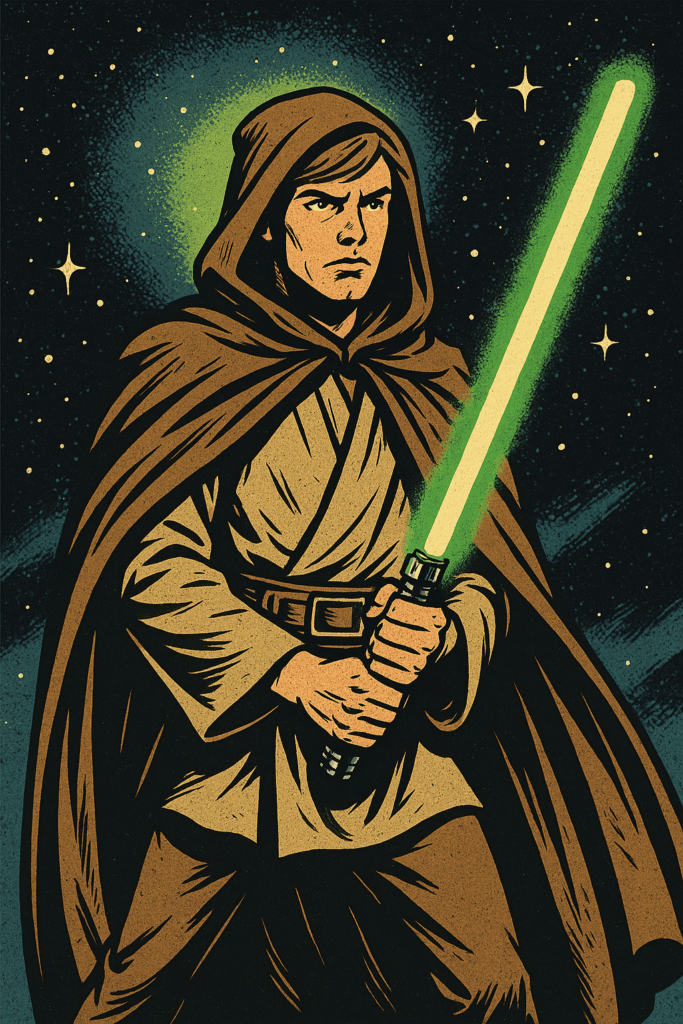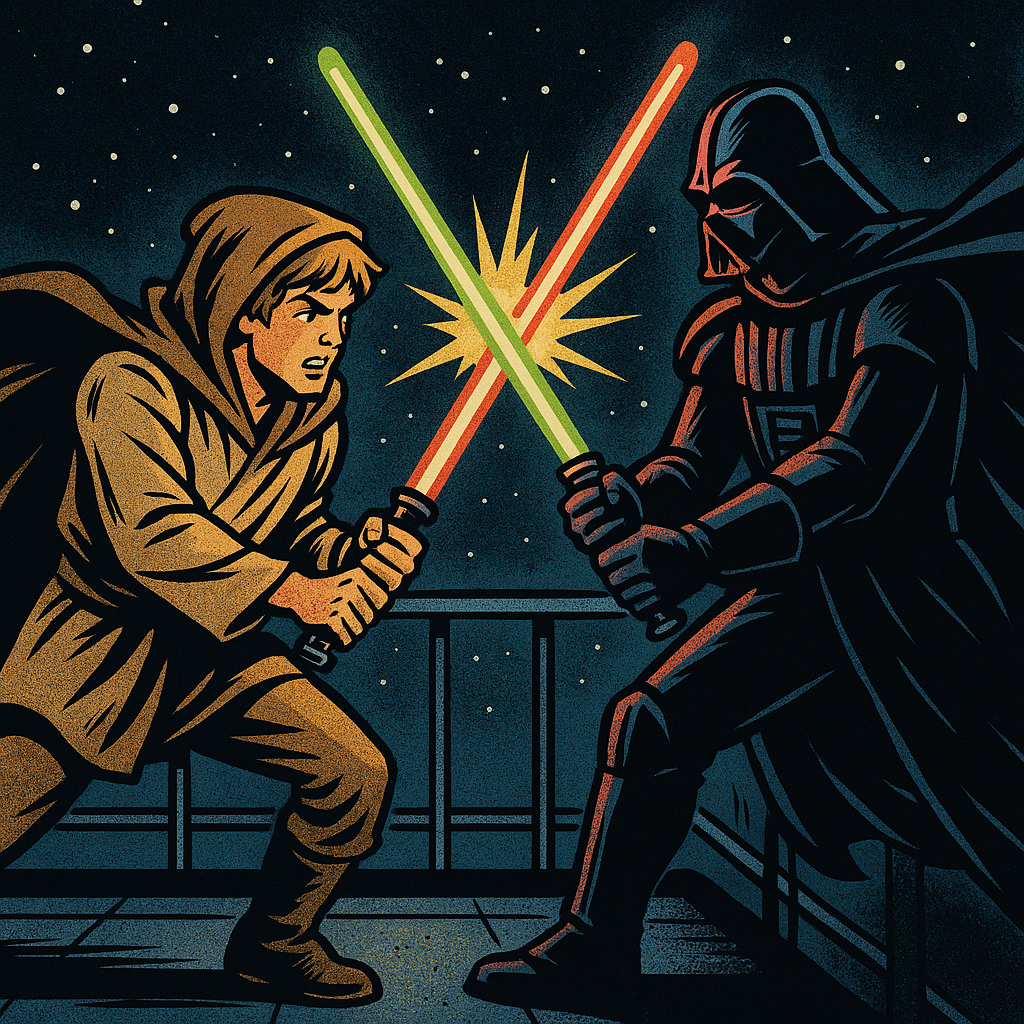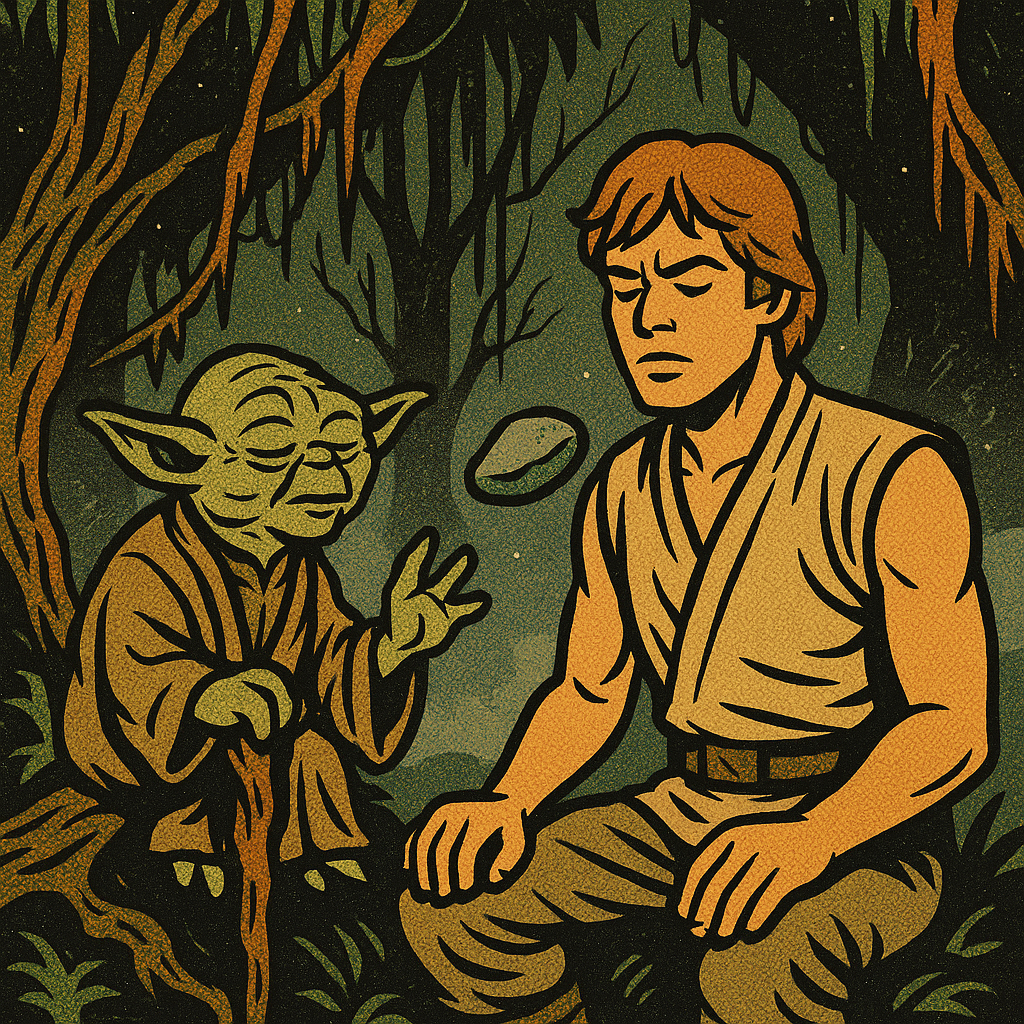
INFP
Luke Skywalker is one of the most beloved figures in the Star Wars universe, and his personality resonates strongly with INFP traits. Known as the dreamers and idealists of the MBTI world, INFPs are guided by a deep sense of personal values and a longing to stay true to their inner compass. From his humble beginnings on Tatooine to his transformation into a legendary Jedi Knight, Luke shows the quiet determination, moral conviction, and empathy that reflect INFP cognitive functions in action.
Luke Skywalker INFP vs. Darth Vader INTJ – A Battle of Ideals and the Iconic “I Am Your Father” Scene

Luke Skywalker embodies the INFP spirit — guided by Introverted Feeling (Fi), he stays true to his inner values, even when confronted with impossible choices. His Extraverted Intuition (Ne) shines in his unshakable belief that there’s still good in Darth Vader. Across from him stands Vader, the ultimate INTJ: a master of long-term planning (Ni) and Extraverted Thinking (Te), using strategy and dominance to bend the galaxy to his will.
Their clash in The Empire Strikes Back is more than lightsabers — it’s a collision of worldviews. The “I am your father” revelation epitomizes the tension between INFP conviction and INTJ calculation. Luke, driven by compassion, refuses to surrender his soul, while Vader’s cold logic seeks to reshape his son’s destiny. This duel captures the timeless struggle between light and dark, heart and mind — one guided by values, the other by vision.
Luke Skywalker INFP and Yoda INTP – Force Training and Personality Growth

Luke Skywalker’s time training with Yoda is one of the most defining chapters of his INFP journey. Guided by Introverted Feeling (Fi), Luke’s struggle on Dagobah wasn’t just about lifting rocks — it was about aligning his values with the Force. Yoda taught him patience, humility, and the importance of trusting intuition (Ne) over technology or logic.
This swamp training ground became the crucible where Luke learned to close his eyes, listen inwardly, and find the courage to face Darth Vader. His interactions with Yoda reveal the INFP’s path of growth: learning that true strength comes not from force of will alone but from empathy, connection, and inner harmony. These lessons echo throughout his battles, from the trench run to his final duel with Vader, proving that Luke’s compassion was always his greatest weapon.
INFP Cognitive Functions in Luke’s Journey
- Dominant Introverted Feeling (Fi): Luke’s decisions are deeply personal. He follows his moral instincts, whether it’s saving Darth Vader in Return of the Jedi or refusing to strike down Kylo Ren in The Last Jedi. His choices come from within, not from external pressure.
- Auxiliary Extraverted Intuition (Ne): Luke sees possibilities others miss. From believing there’s still good in Vader to daring to think the galaxy can be different, his Ne keeps him hopeful even when odds are stacked against him.
- Tertiary Introverted Sensing (Si): Luke often reflects on the lessons of the past, whether recalling Obi-Wan’s words or holding onto memories of his friends. This Si grounds him.
- Inferior Extraverted Thinking (Te): Strategy doesn’t always come naturally to him, and sometimes he learns the hard way (like charging into Cloud City in The Empire Strikes Back). But over time, his Te develops, making him more decisive as a leader in Return of the Jedi and beyond.
Star Wars Movies Featuring Luke Skywalker
Luke’s arc spans nearly the entire saga:
- Star Wars: A New Hope (Episode IV) – The farm boy discovers his destiny, guided by Obi-Wan Kenobi.
- The Empire Strikes Back (Episode V) – Training with Yoda, facing Darth Vader, and enduring one of cinema’s most iconic revelations.
- Return of the Jedi (Episode VI) – The compassionate Jedi Knight who risks everything to redeem his father.
- The Force Awakens (Episode VII) – A mysterious presence, hinted at but not revealed until the end.
- The Last Jedi (Episode VIII) – A weary mentor who still holds onto his ideals, passing on wisdom to Rey.
- The Rise of Skywalker (Episode IX) – Returning as a Force ghost, guiding Rey with the same hope he always carried.
- Rogue One and Solo – While Luke doesn’t appear directly, his influence looms as the Rebellion forms.
Notable Battles and Iconic Moments
- The Death Star Trench Run (A New Hope): Luke’s Force-guided shot destroys the Death Star, proving he can trust his instincts.
- The Duel on Cloud City (Empire Strikes Back): Facing Vader with little preparation, he shows raw courage, even after losing his hand.
- The Rescue at Jabba’s Palace (Return of the Jedi): A confident, robed Luke walks into Jabba’s lair, green lightsaber igniting in one of his most stylish entrances.
- The Final Duel with Vader (Return of the Jedi): Rather than kill, Luke throws away his weapon, embodying INFP compassion and mercy.
- The Showdown on Crait (The Last Jedi): His Force projection against Kylo Ren is one of the most selfless, poetic acts in Star Wars.
Relationships and Key Interactions
- Han Solo: Luke’s idealism balances Han’s cynicism. Their banter in A New Hope and camaraderie across the trilogy show how opposites can bond.
- Princess Leia: As siblings, their connection is both instinctive and heartfelt. They support each other through grief and leadership burdens.
- Padmé Amidala: Though not interacting directly in the films, Padmé’s legacy flows into Luke’s compassion and belief in redemption.
- R2D2 and C-3PO: The droids are constant companions, with R2 saving Luke more than once (Death Star, Dagobah, Jabba’s sail barge).
- Chewbacca: A loyal ally whose strength complements Luke’s quiet conviction. Their bond adds warmth to the Rebellion’s circle.
- Darth Vader: The central relationship of Luke’s arc. Luke’s refusal to give up on his father shows the INFP’s unshakable faith in inner good.
- Yoda: As Luke’s teacher on Dagobah, Yoda pushes him to trust the Force beyond logic and tools. This guidance strengthens Luke’s INFP reliance on intuition and inner values. Yoda teaches him patience, focus, and the importance of self-awareness, helping Luke embrace the Force as more than power — as a spiritual connection that aligns perfectly with his empathetic nature.
Using the Force and Staying True to Values
Luke’s connection to the Force is deeply emotional, not just technical. He doesn’t view it as a tool for domination but as a spiritual bond. From trusting the Force to land the Death Star shot to becoming one with it in The Last Jedi, Luke uses the Force as an extension of his values. This is quintessential INFP — the Force is not about power, but about meaning, connection, and hope.
What Fans and Dreamers Can Learn from Luke Skywalker
- Stay true to your values, even when pressured otherwise.
- Hope can redeem even the darkest situations.
- True strength lies in compassion, not aggression.
- Learning from failure is part of growth.
- Idealism is not weakness — it can change the galaxy.
Famous Quotes
- “I am a Jedi, like my father before me.” — A declaration of identity, reflecting INFP authenticity and loyalty.
- “No one’s ever really gone.” — A line that embodies the eternal hope and belief in inner goodness, hallmarks of Luke’s personality type.




